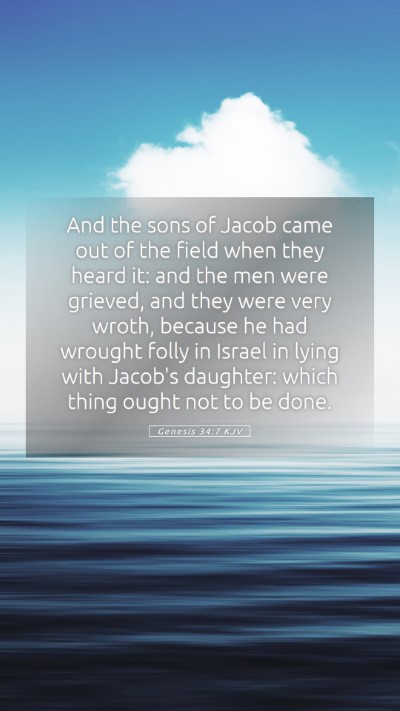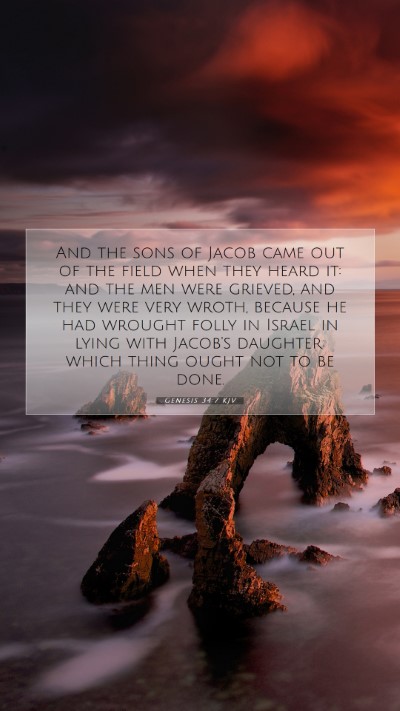Understanding Genesis 34:7
Bible Verse: Genesis 34:7
In Genesis 34:7, we witness a significant event that highlights the emotional and moral consequences of actions taken by individuals, particularly in the context of family honor and societal values. The verse states:
"And the sons of Jacob came out of the field when they heard it: and the men were grieved, and they were very wroth, because he had wrought folly in Israel in lying with Jacob's daughter; which thing ought not to be done."
Verse Explanation and Commentary
The commentary on this verse encompasses various insights that deepen our understanding of its meaning. Matthew Henry, Albert Barnes, and Adam Clarke provide thoughtful analyses that align closely yet offer distinct perspectives.
Context of the Passage
The Historical Background: This chapter narrates a troubling event involving Dinah, the daughter of Jacob, who is defiled by Shechem, the son of Hamor. This incident sets the stage for the subsequent actions of Jacob's sons, who respond with anger and vengeance.
Emotional Responses
- Grief and Anger: Jacobs' sons return from the field to discover the distressing news. Their emotions—grief and anger—reflect their sense of familial loyalty and honor. They perceive Shechem’s actions as not only a personal affront to Dinah but also a transgression against their family and community values.
- Wrothness: The term "wroth" conveys a strong, almost fiery indignation. This signifies a collective outrage that could lead to severe repercussions, as the societal norms are deeply violated by Shechem's actions.
Morality and Consequence
This verse illustrates the moral code of ancient Israel. The phrase "which thing ought not to be done" underlines the gravity of the wrongdoing that has taken place. The commentary from Albert Barnes emphasizes that the act was seen as a grave folly—an action that contradicts the established standards of conduct within the family and broader community.
Biblical Exegesis
Adam Clarke notes that the term "folly" signifies not just a mistake but a violation of social and moral boundaries. The explanation of the intent behind this passage is crucial for readers seeking a deeper connection with Scripture. The act is not merely personal; it reverberates throughout the community, prompting a reflection on consequences—warnings that echo through history.
Significance of the Verse
- Family Honor: The intense reactions of Jacob's sons highlight the importance of honor within a familial structure, a critical aspect of ancient Near Eastern culture.
- Justice and Retribution: The passage sets up a narrative about justice, underscoring the consequences of moral failures and the imperative of responding to injustice.
- Application to Daily Life: This event prompts readers to consider modern implications of honor, integrity, and the societal repercussions of personal actions.
Related Bible Verses
- Deuteronomy 22:25-27 - Discussing laws regarding sexual indiscretions.
- Exodus 22:16-17 - Regulations concerning the seduction of virgins.
- Proverbs 19:16 - The importance of preserving one's honor and integrity.
Conclusion
Genesis 34:7 serves as a pivotal moment that illustrates not only individual but collective responses to transgression. The insights drawn from prevalent Biblical commentaries enhance the understanding of family dynamics, social values, and morality in biblical texts. For those engaging in Bible study, this verse provides a profound opportunity for discussion on ethical behavior and the far-reaching implications of personal choices within a community.
The analysis of Genesis 34:7 ultimately encourages readers to reflect on the meaning of Bible verses regarding ethics, justice, and the intricate weave of human relationships, ensuring that such lessons remain not only historical but applicable in today’s context.
For further study, consider delving into Bible study groups or utilizing Bible study tools to explore these teachings more deeply.


